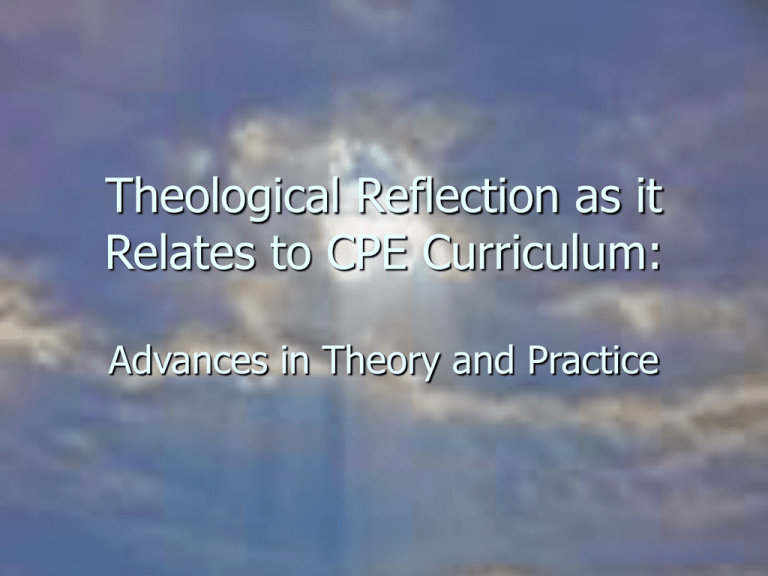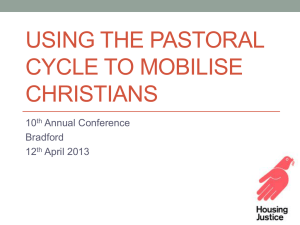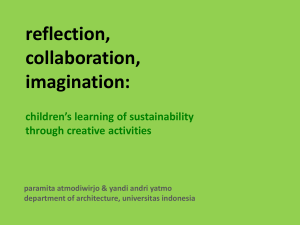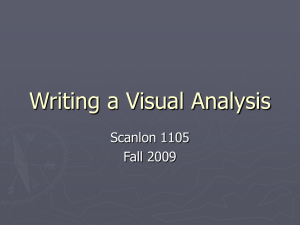Theological Reflection as it Relates to CPE
advertisement

Theological Reflection as it Relates to CPE Curriculum: Advances in Theory and Practice Who I Am Now United Methodist clergywoman of 30 years Have served as pastor, associate pastor, chaplain and contract supervisor Have been married, had children, divorced and remarried Have never worked fulltime since having my first child 20 years ago. Youngest son presented with psychiatric special needs in 2004 at the age of 8. He was hospitalized 8 times between 2004 and 2010. After 6 hospitalizations since March, he presently resides in a residential treatment program, our having given up custody to the state to afford his treatment. Theological Reflection as it Relates to CPE Curriculum: Advances in Both Theory and Practice Saying “Yes” to God’s Invitation COGNITIVE (Understanding) How is theological reflection important to CPE curriculum How is it important to the learning and pastoral experience as designed by the curriculum. EXPERIENTIAL (How to do it) Not just how to do theological reflection How to listen to and internalize the spiritual message How to live in such a way that reflecting theologically makes a difference in our relationships ACPE Standards regarding theological reflection Terms and Definitions– ‘theological reflection’ does not appear. Standards—’theological reflection’ is mentioned one time, in APPENDIX 2 (Common Standards for Professional Chaplaincy, page 29, Section III, Pastoral) PAS9: The Candidate for certification must facilitate theological reflection in the practice of pastoral care. Accreditation Manual— ‘theological reflection’ appears one time in APPENDIX 6 B (Sample: Clinical Pastoral Education Alumni(ae) Questionnaire, page 81) where it asks the alum to « Identify program components you felt were particularly strong (indicate with “S”) and those that were not helpful (“NH”). » Certification Manual— ‘theological reflection’ does not appear. What Makes Theological Reflection so Difficult? It has the word THEOLOGY in it It has the word REFLECTION in it THEOLOGY The intimidation factor Cognitive process where one considers and articulates an understanding of theological concepts as they pertain to human experiences Often about very personal and intimate matters of the heart REFLECTION Not to be rushed into or through Microwaveable society Tankless hotwater heaters Seconds to comminicate around the world Bigger, better, faster Be still and know Meet certain quotas of patients per day Have department meetings PDA’s filled with just enough breaks to get to next meeting Splitting of Mind and Spirit Is this Helpful ? The psyche job is to create links and associations in the interest of intergration, wholeness and personal intergrity. In pastoral care, the extreme/trauma often becomes a matter of course. All elements of the trauma cannot be present at once In trauma, the psyche often does not link, but splits, in order to protect itself. In trauma the psyche’s goal is survival, not integration. Pastoral caregiver called to hold more of the elements than individual members can assimilate Splitting of Mind and Spirit How might it be unhelpful? Ideas, constructs and systematic theologies have little currency within the traumatized psyche since they only serve the splitting function of trauma. For the traumatized chaplain, even more so the traumatized patient or family, rationalizing the trauma may lead to isolation and shutting down. Rationalization may numb or isolate the affect but not provide a pathway for the trauma to lead to any real, lasting new meaning or reorganization. THE KEY Simple Profound Subjective Objective way to reflect on powerful experiences during the immediacy of the moment Favorite 10 Definitions for Theological Reflection 10. Blah 9. Blah 8. Blah 7. Blah 6. Blah 5. Blah 4. Blah 3. Blah 2. Blah 1. a self-conscious, intentional act in which one seeks to know God and be known by God so that one can love God and others as God loves Heather A. Warren, Joan L. Murray and Mildred M. Best (2002) 'The discipline and habit of theological reflection.' Journal of Religion and Health Vol. 41, No. 4. Winter p. 324 Theological Reflection Exercise Saying “YES” to God’s invitation To relationship with God To relationship with God’s children To relationship with ourselves Saying “Yes” to God’s Invitation Starting point must include……….. Every single encounter, moment, experience is an invitation from the divine to meet the divine. In order to have this communion with God, one must trust one’s free associations. Our free associations are the silent conversations of the Holy inviting us, guiding us toward relationship. After the encounter Take Four Steps Relationships Scriptures Meanings Implications RELATIONSHIPS Reflecting on the encounter, let your free associations identify the relationships impacting the encounter. NOT just among the people physically present or even alive. May be between a person and an inanimate object or a concept. Don’t forget about systems or faith traditions, etc. Name relationships in most simple form possible, i.e. mother and son not Mrs. Carter and John or patient and chaplain not young woman from Ohio and Sam. SCRIPTURE Forget the particularities of the encounter; look only at relationships. What scriptural free associations arise from the relationships Describe the scriptural story in a phrase, i.e. Jacob wrestling with the angel. Do this without much fore or after thought. Do not just go down the list—listen to your free associations. SCRIPTURE Forget the particularities of the encounter; look only at relationships. What scriptural free associations arise from the relationships Describe the scriptural story in a phrase, i.e. Jacob wrestling with the angel. Do this without much fore or after thought. Do not just go down the list—listen to your free associations. MEANING DON’T think about the encounter OR the relationships…..look only at the scripture What are the free associations that arise regarding the descriptive phrases? What meaning do you discern from looking at the phrase? Listen to the Holy in your free associations—exegesis and commentaries have no place here. MEANING DON’T think about the encounter OR the relationships…..look only at the scripture What are the free associations that arise regarding the descriptive phrases? What meaning do you discern from looking at the phrase? Listen to the Holy in your free associations—exegesis and commentaries have no place here. IMPLICATIONS Brings us full circle……………… Look only at the meanings, the messages born from scripture through your free associations. Imagine how, if you could have been aware of them in the moment, how these spiritual insights might have shaped the conversation. Movie A Pastoral Encounter Reflect on a pastoral encounter. Quickly list the relationships Quickly let scripture arise Quickly discern the meaning of that scripture Quickly think of how that/those scripture can inform your response(s) How Theological Reflection Exercise Moves Us Toward Relationship If we can learn in the immediacy of the moment…. by way of our free associations…. to notice the relationships in the encounter…. be aware of scripture that come to mind when we think of those relationships…. listen for the meaning of that/those scripture… and let that awareness inform our pastoral response then we will have listened to the holy and become a bridge for the holy. There is a contemplative in all of us, almost strangled— but still alive, who craves quiet enjoyment of the Now, and longs to touch the seamless garment of silence which makes us whole. Alan Tory








